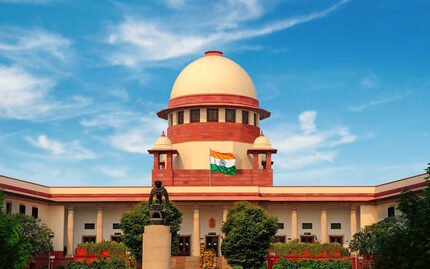Published On: 18 Mar 2023 6:45 AM IST
New Delhi: The Supreme Court of India on Friday, refused to entertain a petition seeking enforcement of the guidelines and directions laid down in Anuradha Bhasin v Union of India and Ors to prevent internet shut downs in the state of Rajasthan. The bench comprising CJI DY Chandrachud, Justice PS Narasimha, and Justice JB Pardiwala opined that the petitioner had the remedy to approach the High Court under Article 226 of the Indian Constitution, which was the appropriate forum to deal with the issue. Thus, the court directed the petitioner to approach the High Court and dismissed the petition.
The petitioner, Chhaya Rani, an advocate practising in the Rajasthan High Court, had urged the Supreme Court to hold the state of Rajasthan in contempt of the Anuradha Bhasin principles regarding the imposition of restrictions on the internet in a proportionate manner. The petition had argued–
“The internet shutdown order was passed to minimise the chances of cheating or copying in the examination. This shows the incompetence of the state government and Rajasthan Public Service Commission. The apprehension of cheating and malpractice is vague and arbitrary. There remains no evidence or assurance that the imposition of the internet shutdown would achieve the purpose that it seeks to achieve which is the prevention of cheating and malpractice in the scheduled examination. On the contrary, such imposition has affected the citizens at large and has impacted the access to justice, right to carry the profession, and right to freedom of speech and expression through the internet.”
Amid fears of a paper leak, the state government decided to temporarily suspend internet services in Rajasthan between February 25 and 27. This would ‘strengthen the arrangements for the event’ and to ensure ‘complete vigilance’, Bharatpur’s divisional commissioner disclosed in an order, one day before the Primary (Level I) and Upper Primary (Level II) School Teacher Direct Recruitment Examination 2022 was scheduled to be held. The affected districts were Alwar, Ajmer, Bhilwara, Bikaner, Bharatpur, Jodhpur, Jaipur, Kota, Sriganganagar, Tonk, and Udaipur.
The petitioner had claimed that this practice flies in the face of the decision in Anuradha Bhasin v. Union of India, in which the apex court not only laid down procedural rules for internet shutdowns, but also supplemented them with the requirement of timely reviews and non-permanence of shutdown orders. Not only does an internet crackdown like the one in Rajasthan violate free speech and the freedom of business, trade, and profession enshrined in clauses (a) and (g) of Article 19(1), but it also violates the right of litigants to access justice in a post-COVID world where video conferencing facilities have become an indispensable part of the judicial architecture, the petitioners submitted.
The petition was drawn by Advocate Vishal Tiwari and filed through Supreme Court Advocate-on-Record Abhigya Kushwah.
Case Title: Chhaya Rani Sharma v. UoI And Ors. WP(C) No. 358/2023



